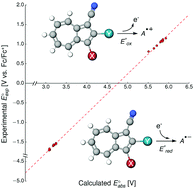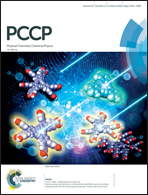The quest for determining one-electron redox potentials of azulene-1-carbonitriles by calculation†
Abstract
Electrochemical processes drive many chemical and biochemical reactions. Theoretical methods to accurately predict redox potentials are therefore crucial for understanding these reactions and designing new chemical species with desired properties. We have investigated a theoretical methodology using electronic structure methods based on density functional theory and continuum solvation models. These methods have been validated with linear correlation plots comparing theoretical and experimental results for the redox properties of a series of azulene derivatives. The results showed excellent correlations despite only minor structural variations of the azulenes, which support this rather simple theoretical methodology for determining redox potentials of organic molecules. Furthermore, we have estimated the absolute redox potential of the ferrocene/ferrocenium redox couple to be 4.8 ± 0.1 V in dichloromethane, which is slightly lower than previous estimates.



 Please wait while we load your content...
Please wait while we load your content...